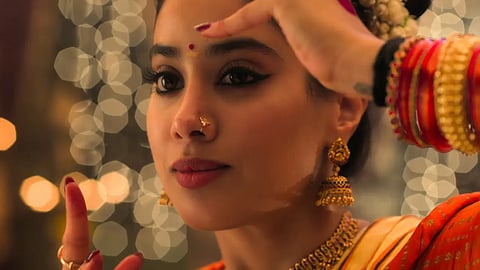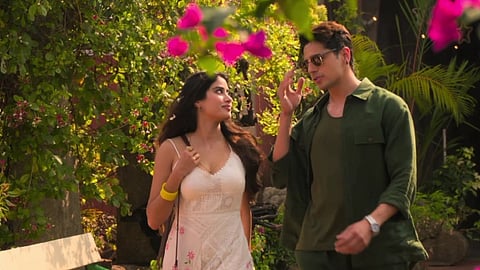The north-south India chasm is called up for silly, flat comedy
Sidharth Malhotra and Janhvi Kapoor share the most leaden chemistry ever
The sliver of a plot is entirely subsumed by empty, pointless references
Param Sundari Review | Sidharth Malhotra And Janhvi Kapoor Are The Year’s Dullest Duo In Kerala-Tourism-Ad Disaster
Cultures collide in an early contender for the year’s worst film
A Delhi boy flies down to Kerala, convinced by a new dating app his soulmate is waiting for him. His over-reliance on data gradually takes a backseat as he learns to follow his own feelings. That pretty much sums up Param Sundari, a film that should instantly get dumped in the annals of cinematic waste. A spoilt daddy’s boy, Param’s (Sidharth Malhotra) start-ups keep failing. He’s chasing one rare, bright idea that’ll change the world. When someone pitches a new dating app in the making for him to back, he’s not instantly enthused. But some hocus pocus about the in-built effectively aligned data—tested by the best psychologists and AI—persuades him to give it a shot. His father promises investment only if he can prove the soulmate match is no fluke. So, off Param goes and lands at a town in Alleppey.
Don’t be mistaken in looking for wit or spark on this film. There’s no purpose here—only a bland regurgitation of the vast unfamiliarity a Delhi hunk like Param encounters in Kerala. Scenes run on, diffuse and you wouldn’t even bother. The only thing prepossessing the makers is flinging every cultural cliché at the wall. Param Sundari puts up a flamboyant show of Kerala—but viewed firmly through a standardising, northerner lens. So, there are ample digs of casually racist, gleefully insensitive humor, starting right when Param zeroes in on Kerala. Pronunciations are obviously mangled. When the particular town is invoked, Param's friend Juggy wonders if it’s in Africa or Sri Lanka. The boys setting out for Kerala’s backwaters becomes yet again a reiteration of the north Indian’s echo chamber habits. The film struggles to emerge into its own. I’d say it’s not even interested in having any identifiable voice. It’s too sunk under absorption in being an extended tourism ad. Director Tushar Jalota hands out a procession of sequences, each popping off the north-south chasm.

Param Sundari routinely trundles out a joust of Kalaripayattu, a ridiculous Mohiniyattam performance by Sundari in an empty church, and a boat race in its climax. These are all neatly tied within the ambit of Onam, of course, so Param gets the complete cultural tour. Nevertheless, specificities of tradition ultimately get washed away in one of the most inert love triangles ever put on film.
Kerala gets propped up as a place where every cab driver is only casually, copiously drinking toddy in bright daylight, a nondescript nurse makes brazen sexual advances on Param while insisting on a “full body-checkup”, a tacky CGI-rendered elephant wanders about, yet not huge enough for Param to notice. Network often zaps in the precincts of the homestay Sundari (Janhvi Kapoor) runs, where Param arrives. Amidst all these, you’ll have to unfathomably discount the extremely stalkerish attitude of Param, the creepiness in his resolve to tail Sundari and compel her to fall for him.
What clearly exacerbates matters here is the glaze that sticks tightly onto Malhotra’s face. Emphasis is placed on his buffed-up physique, but you’ll be struck more by how unintentionally non-existent he renders the gap between heartbreak and joy. One minute, he’s downbeat, his father railing at him. Promptly, he forgets it all and strides out, exuberant. Malhotra can barely make a scene scrape by and the film’s self-evident weakness amplifies it tenfold. He goes the regular emotional grind without bringing any ache or genuine feeling. In tandem with the film, his performance flattens any other response you may have, redirecting it into single-note, indivisible boredom. A film like this demands an actor with immense charisma, one who can dazzle and crack you up. Malhotra tries so desperately to turn on high charm, he grates more than sweeps you away.

A similarly inadept Kapoor ensures Param Sundari isn’t drowned by Malhotra alone. Jalota and DP Santhana Krishnan Ravichandran busy themselves solely with framing Kapoor through flattering angles. An initial flicker of Sundari displays her no-nonsense ferocity. Of course, her character quickly takes a smooth turnaround, all brittleness withering under Param’s charm attack. Her defences and scepticisms melt. Kapoor’s accent is as fickle as a private company’s HR. Sundari has no social life, having devoted her entire self to the community, town, keeping the homestay running after her parents’ sudden death.

She does challenge a desperately wooing Param, gives him a schooling on Malayalam culture and struts along as soon as Param flashes deep, sincere interest. Or is his curiosity fake? Malhotra’s confoundingly paper-thin performance warrants a “you never know”. Also, he can’t alone be sent to the gallows for very blatant hollowness in writing. The screenplay, which Jalota has written with Aarsh Vora and Gaurav Mishra, never proceeds beyond a litany of bullet points on Kerala tourism. There’s beauty here, courtesy the picturesque natural expanses, but the gaze is too complacent, remaining reduced to just that. Buried amidst the endless references and throwbacks lies nothing—just a lazy, listless film, overly prettified and entirely perfunctory in shaping characters and key decisions.
